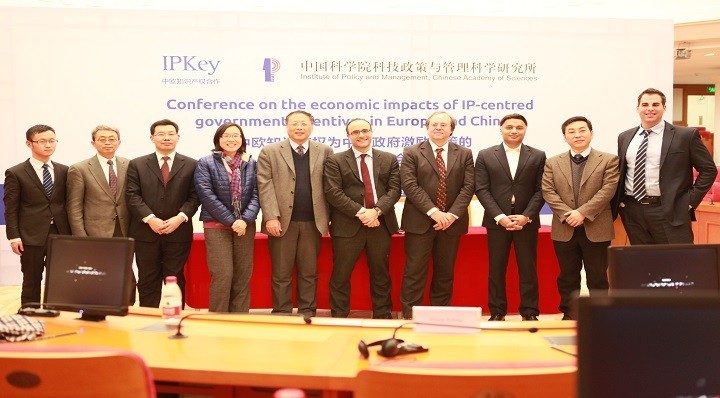
IP Key-CAS IPM Conference on the economic impacts of IP-centered government incentives in Europe and China
Theme of conference
Various countries’ governments have employed different monetary incentives in an attempt to correct market failures. One branch of these incentives is what could loosely be termed “intellectual property (IP)-centered” incentives, namely those based on mandatory requirements related to IP. These incentives appear primarily intended to stimulate innovation, although in some cases may be more so intended to stimulate IP awareness or meet other objectives. As innovation becomes an increasingly important driver of the economic future of many countries, as IP becomes an increasingly important asset determining firms’ competitiveness, and as different countries experiment with IP-centered incentives and look to the experience of other countries in doing so, it is important to critically assess the impacts of state-provided IP-centered incentives in terms of their impacts on the economy.
This activity, organised by the IP Key Project (implemented by the Office for Harmonization in the Internal Market [the trademarks and designs office of Europe] and the European Patent Office) in partnership with the Chinese Academy of Sciences Institute of Policy and Management (CAS IPM), brings researchers together to analyse the workings of state-provided IP-centered incentives in Europe and China in particular. It will advance high-quality research on this subject, foster links among researchers in China and Europe, and provide practical recommendations to policymakers considering crafting new or revising existing IP-centered government incentives.
A range of stakeholders involved in IP and economic policy analysis and policymaking in Europe in China will be invited to attend the conference. In particular, invitees include officials and researchers from China’s Ministry of Finance (MoF), State Intellectual Property Office (SIPO), Ministry of Science and Technology (MoST), State Administration of Taxation (SAT), and representatives from provincial/municipal IP offices in China; representatives from the European Commission’s DG Research & Innovation, and DG Trade; OHIM officials; IP attachés based in Beijing and other representatives of EU Member States’ embassies in Beijing; Chinese researchers/academics; and representatives from domestic and foreign industry associations based in China.
Some presentations and moderation will be in English, others will be in Chinese. English-Chinese interpretation will be provided.
If you are involved in IP and economic policy analysis or policymaking and would like to attend the conference please contact Grace Gao at grace@ipkey.org regarding possible conference attendance. Please be aware that seating is provided on a priority basis for government officials and academics.
AGENDA
MORNING SESSION
- 09: 00 – 09:20 Introduction to CAS IPM, and importance of work in IP and S&T policy -- Zhang Xuecheng, Deputy Director General, CAS IPM
-
09:20 – 09:40 IP Key welcome and presentation -- IP-centered monetary incentives: an underexplored instrument of industrial policy in latecomer and technological frontier economies: Dan Prud’homme, Technical Expert, IP Key Project of OHIM and EPO
-
09:40 – 10:00 Research on patent fees and policies for stimulating patents in China: What led to the upsurge of China’s domestic patent applications? -- Prof. Song Hefa, Vice Director, IP Institute, Associate Prof., Chinese Academy of Sciences Institute of Policy and Management (co-author with Li Zhenxing and Xu Dawei CAS IPM)
-
10:00 – 10:20 IP-centred government incentives in Germany and the EU: workings, dangers, and recommendations -- Dr. Johannes Holzer, Head of Utility Model and Typography Section, Germany Patent and Trade Mark Office
-
10:20 – 10:40 The EU’s R&D tax incentives based on IP requirements: composition, impacts, and recommendations -- Vinod Kalloe, Head of International Tax Policy, KPMG Netherlands
10:40 – 11:00 Tea break
-
11:00 – 12:00 Panel discussion and Q&A: (1) workings and impacts of patent fees (2) tax schemes and other IP incentives
-
Moderator: Dan Prud’homme
-
Main speakers: Duan Yibing, Prof., Chinese Academy of Sciences Institute of Policy and Management, Johannes Holzer, Vinod Kalloe, and Song Hefa
12:00 – 13:30 Lunch and optional tour of CAS IPM museum
AFTERNOON SESSION
- 13:30 – 13:50 Intellectual property as a mechanism for urban economic development: evidence from China’s “IP Demonstration Cities” -- Zhang Yafeng, Research Assistant, CAS IPM (co-author with Liu Haibo and Jin Zhongzhen, CAS IPM)
-
14:10 – 14:30 China’s patent explosion: an empirical analysis from a systems and policy perspective -- Liu Yun, Director of Research Center for Scientific Assessment and Innovation Management, Prof., Beijing Institute of Technology (co-author with Tan Long and Cheng Yijie, Beijing Institute of Technology)
-
14:30 – 14:50 An empirical analysis of patent quality from higher education institutions in China -- Chen Xiangdong, Prof., International Technology Transfer and Innovation Studies, Beihang University, China (co-author with Song Shuang, Zhang Gupeng, and Yang Jian-an, Educational Research Center, Ministry of Education of China)
-
14:50 – 15:10 The impact of public support for SMEs’, patenting activity: empirical evidence from Italy -- Federico Munari, Assoc. Prof. , Technology and Innovation Management, University of Bologna, Italy (co-author with Xu Liang, Sichuan International Studies University)
-
15:10 – 15:30 China’s patent explosion and its quality implications -- Cheryl Xiaoning Long, Prof., Chair, Department of Economics, School of Economics, Xiamen University (co-author with Wang Jun, Xiamen University)
15:30 – 15:45 Tea break
-
15:45 – 16:45 Panel discussion and Q&A: workings and impacts of (1) IP demonstration cities and other IP-based regional development policies, and (2) patent subsidies and other IP incentives/award programs
-
Moderator: Song Hefa
-
Main speakers: Liu Haibo, Liu Yun, Cheng Xiangdong, Federico Munari, Cheryl Xiaoning Long
-
16:45 – 17:00 Conclusions from conference, Dan Prud’homme
-
17:00 – 17:15 Conclusions from conference, closing remarks, Song Hefa
